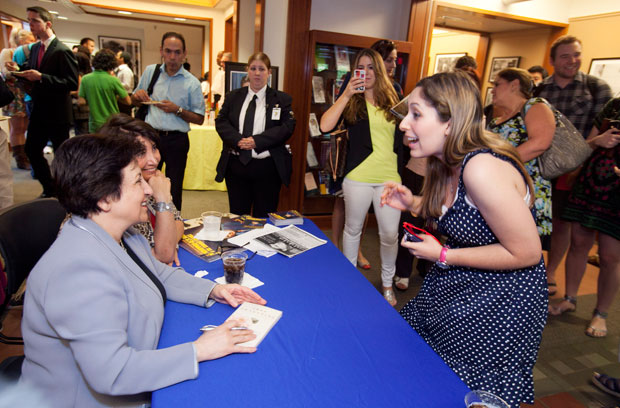
Nondemocratic governments pose a greater threat to sustainable peace than nuclear weapons, according to Iranian human rights activist Shirin Ebadi, who spoke Monday at Duke University's Sanford School of Public Policy. During negotiations on Iran's uranium enrichment program, the United States should seek to hold Iran accountable for its human rights record, she said.
Ebadi, a Nobel Peace Prize laureate, lawyer and former judge in Tehran, delivered the 2012 Crown Lecture in Ethics to a capacity crowd in Fleishman Commons. The event was co-sponsored by the student-led Speakers & Stage committee of the Duke University Union.
Ebadi said she expects respect for human rights should be on the table when six nations resume talks in Baghdad on May 23. Ebadi questioned what Secretary of State Hillary Clinton meant when she said the United States would consider "assurances" sought by the government of Iran.
"America states that human rights are a political and a social value," Ebadi said. "I want to know what is the depth of their sincerity? Assuming that Iran agrees to stop enrichment, are you willing to shake hands with a government that violates human rights? Do politicians who behave this way believe in human rights?"
Both sides emerged from a dialogue in Istanbul last weekend sounding hopeful. However, Ebadi was more circumspect. "One cannot trust a government that does not pay attention to any of the internal law criteria," she said.
Ebadi recounted some of the continuing human rights abuses in her country, which she said executes more people per capita than any other nation on earth, at a rate of one every two days. Iran also has jailed more journalists than any other nation, she said.
"Capital punishment exists for 59 crimes, and some of them are really absurd. For example if a Muslim consumes alcohol he is punished by flogging the first two times. If he drinks a third time he will be executed," she said. In February a man was sentenced to death, according to initial reports, for refusing to renounce his Christian faith.
Some of Iran's best students are in prison, and university students who took part in widespread protests after the disputed elections in June 2009 were shot to death, injured or imprisoned. It was at that point that Ebadi, also threatened, fled Iran. She has lived in exile since.
She reiterated that she is against military action and further economic sanctions, both of which harm Iranian citizens. Reform must come from within, with support from the international community, she said.
Ebadi called on Americans, as friends of the Iranian people -- although not the Iranian government -- to pressure their leaders not to "sacrifice human rights in economic or nuclear negotiations." Pointing to South Africa and Burma, Ebadi said the international community can, and has, affected the development of human rights and democratic reforms.
"I think you cannot stop the sun from shining and in general human rights are improving. ... but in some countries it is so slow people lose patience."
Edabi was raised in Tehran and studied law at the University of Tehran. In 1975, she was the first woman to serve as a judge in Iran, but was demoted to a clerk after the Iranian revolution in 1979. She resigned and began legally defending journalists, women and political activists. She was one of five founding members of the Defenders of Human Rights Center, and the only woman. In 2003, she was the first Muslim and the first Iranian to receive the Nobel Peace Prize.
Following her talk she signed copies of her latest book, "The Golden Cage: Three Brothers, Three Choices, One Destiny," which she described in a recent interview as a metaphor for the tensions between Israel, the United States and Iran.
The Crown Lecture in Ethics is named for benefactor Lester Crown, and brings speakers to Duke to explore ethical issues in the arts, sciences, medicine, business and other fields.
Pictured below, Shirin Ebadi signs a copy of her book for Duke sophomore Tania Hassanzadeh after the lecture Monday night. Photo by Jared Lazarus.
